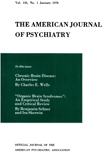STUDIES OF PARENTAL DEPRIVATION IN PSYCHIATRIC PATIENTS
Abstract
Knowledge of the frequency of parental deprivation during childhood has hitherto been seriously handicapped by 1. Comparisons between unlike samples, 2. Unrepresentative samples due to selection, 3. Chance errors in sampling, 4. Fallacies in deduction.
These factors have been discussed, and a number of tables presented which contain data from previous studies on the frequency of parental deprivation in the childhood of apparently normal persons and of various groups of psychiatric patients.
Considerable evidence has accumulated (not reviewed in detail here) that indicates an unusually high frequency of both parental death and separation (for various reasons) during the Childhood of individuals who subsequently manifest delinquent, antisocial or psychopathic behaviour.
The evidence has hitherto been inconclusive 1. That an increased frequency of parental deprivation is also associated with other forms of mental disorder, 2. That loss of the mother is necessarily more significant than loss of the father, 3. That the observed association indicates a direct causal relationship between parental deprivation and antisocial behaviour or other abnormalities.
Nevertheless, certain studies point to an increased frequency of parental deprivation during childhood (both by death and in psychoneuroses and schizophrenia (and also by parental psychosis in the two major functional psychoses).
The few statistical studies that examine age at deprivation suggest that, in these disorders, the increased frequency of parental deprivation occurs during the early years of childhood (up to the ages 7 to 10 years).
While an increased frequency of maternal deprivation was found in a large series of young psychotic patients, a relative excess of paternal deprivation was observed in two series of psychiatric patients (one series neurotic, and the other predominantly so).
It is concluded that further investigation will be necessary to establish consistent patterns of parental deprivation (by type of deprivation, age at loss, and parent lost), and that such patterns per se may not indicate exact modes of causation, but may well be of considerable aetiological significance when taken in conjunction with other objective factual data.
Access content
To read the fulltext, please use one of the options below to sign in or purchase access.- Personal login
- Institutional Login
- Sign in via OpenAthens
- Register for access
-
Please login/register if you wish to pair your device and check access availability.
Not a subscriber?
PsychiatryOnline subscription options offer access to the DSM-5 library, books, journals, CME, and patient resources. This all-in-one virtual library provides psychiatrists and mental health professionals with key resources for diagnosis, treatment, research, and professional development.
Need more help? PsychiatryOnline Customer Service may be reached by emailing [email protected] or by calling 800-368-5777 (in the U.S.) or 703-907-7322 (outside the U.S.).



